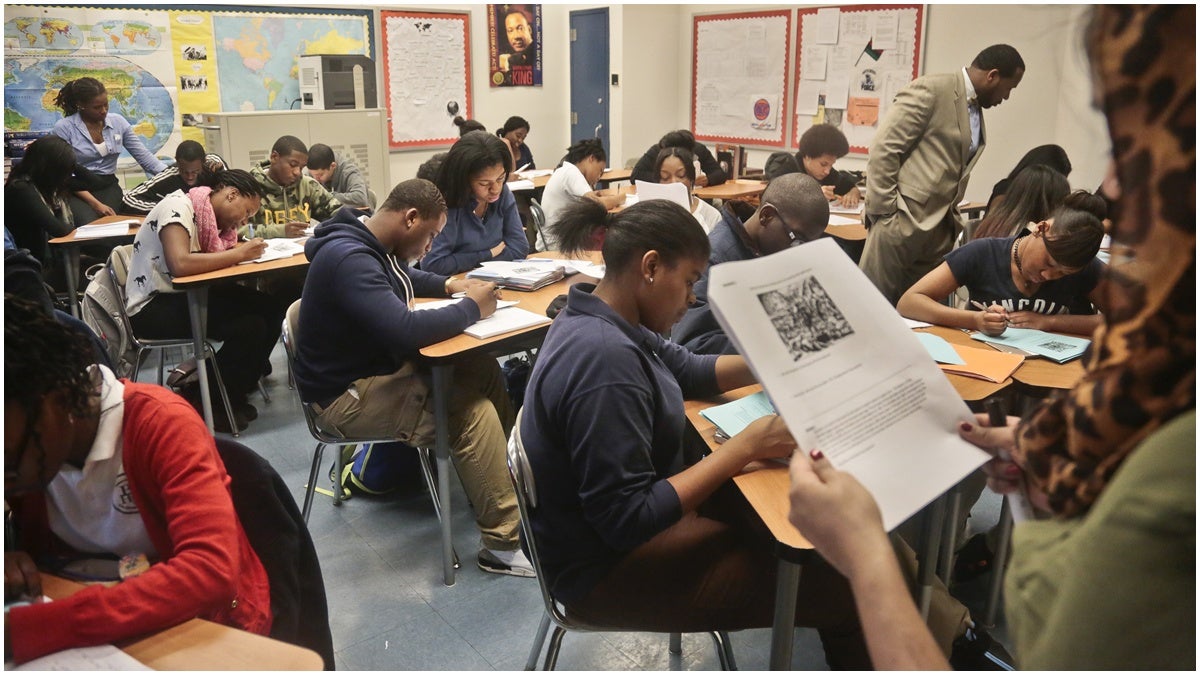Delaware school entrance assessments face tough test

Should Delaware charter and magnet schools require students to take entrance tests? That question is heating up in the First State.
One education advocate called the comments “utterly shocking.” Another tweeted out, “Wow!”
Wow! Director of charter schools @DEDeptofEd, Jennifer Nagourney, comes out saying that she disagrees with assessments as part of entry.
— Mike Matthews (@RCEAPrez) December 8, 2014
Jennifer Nagourney, head of Delaware’s charter school office, told a General Assembly task force last Monday that she disagreed with the use of entrance assessments at Delaware’s charter schools, according to multiple people who attended the meeting.
Some of the state’s highest-performing schools require applicants to take admissions assessments or perform entrance auditions. They include the high-achieving Charter School of Wilmington, which was named the nation’s 10th-best high school by Newsweek this year.
A ban on entrance tests isn’t imminent, but advocates, legislators, and policymakers are taking a close look at the issue. Nagourney’s comments are the latest indication that big changes could be brewing.
“This was utterly shocking for someone in the Delaware charter school office,” said Eve Buckley, an education advocate and history professor at the University of Delaware.
“I remember being very surprised,” said Elizabeth Lockman, one of three parent representatives on the task force.
Nagourney was not made available for comment after the meeting, which was public. There was no transcript or audio recording of the meeting, and meeting minutes will not be approved until the task force meets again in January.
Exams under examination
Her comments come amid a swirl of chatter about how Delaware’s schools of choice—in particular, charter schools—admit students. Earlier this month, the ACLU filed a complaint with the U.S. Department of Education alleging that Delaware’s charter schools contribute to segregation. That complaint focused on the charter admissions process, and, in particular, schools that use entrance tests.
Proponents of entrance assessments say they allow schools and students to match interests, ensuring, for example, that a school focused on the arts can identify students with a real passion for music or dance. Opponents believe they exist primarily to measure academic proficiency, creating elite schools that disproportionately exclude low-income students and students of color.
The General Assembly’s Enrollment Preference task force has been examining these issues since fall 2013. According to a task force report, nine of the state’s 33 choice schools require some sort of entrance exam or student essay.
Last Monday, the task force voted on whether the state should allow entrance assessments at the elementary, middle, and high school levels for charter, magnet, and vocational schools.
The task force voted overwhelmingly against the use of entrance assessments at elementary schools, middle schools, and vocational schools. It narrowly opposed entrance assessments at charter high schools and was split even on whether to allow them at magnet high schools.
The votes are nonbinding, and the task force will merely issue recommendations when it adjourns, likely in spring 2015. But the task force does represent a healthy sampling of the most influential voices in Delaware education—including representatives from the state Department of Education, state board of education, Governor’s office, and General Assembly— and their voting patterns demonstrate the level of scrutiny now facing entrance assessments.
“There’s been some pushback” on assessments, says state Senator David Sokola, who serves on the task force. “It’s no longer just me. It’s people in the community. It’s the ACLU.”
Original intent
Charter schools in particular have been under fire since the ACLU’s complaint. Many say the way certain charters use entrance assessments and essays contradicts the original intent of Delaware’s charter law, passed in 1995.
The law allows charters to grant admissions preference to students who express a specific interest in the school’s teaching methods, philosophy or educational focus. Schools can measure that interest in a variety of ways: student essays, parent essays, interviews, auditions, and assessments.
When legislators debated the charter bill, proponents of the specific interest clause promised that it would not be used to screen students for academic aptitude.
Sokola, who helped pass the original charter law, says that promise has not been kept.
“Fast forward 19 years and you see the way specific interest has been interpreted, specifically by Charter School of Wilmington,” says Sokola. “They’re assuming the kids that do better on a test are more interested. And that’s not always the case.”
Ron Russo, founding president of the Charter School of Wilmington, disagrees. He believes the entrance assessments help schools identify students who would most benefit from their instruction. At his former school, that means screening for students with a specific interest in science and math.
“Why in heaven’s name are we getting bent out of shape with parents who are trying to match their children’s talents and abilities with what schools offer,” Russo asks.
Charter School of Wilmington declined to comment on its admissions practices. But Kendall Massett, executive director of the Delaware Charter Schools Network, says Delaware charters don’t use the specific interest clause to cull the best students and that entrance requirements such as essays and assessments aren’t used to gauge aptitude.
Plus, she argues, sorting students by interest has important educational benefits. “Children that have the same specific interest learn better,” Massett says. “When they’re around other students with the same interests they’re more likely to excel because they have other people they can collaborate with.”
State Representative Kimberly Williams, co-chair of the Enrollment Preference task force, believes current charter school enrollment practice has, in some cases, drifted from the law’s original purpose. She and Sokola say they aren’t necessarily opposed to a school screening for top students, but they do take exception with the notion that schools like Charter School of Wilmington are simply gauging interest.
“You should call it what it is,” says Williams. “It’s an exceptional school for exceptional kids.”
“These practices should not be allowed”
National charter advocates take a similarly dim view of Delaware’s charter enrollment practices. Nationwide, just eight other states permit their charter schools to grant preference for students on the basis of interest or academic performance, according to research by the Enrollment Preference task force.
Groups such as National Alliance for Public Charter Schools encourage charter schools to be open enrollment, and discourage the use of preference by interest or ability. “We have a model law. We’re pretty clear: this is how enrollment should work,” says Todd Ziebarth, the alliance’s senior vice president for state advocacy and support.
He believes practices in Delaware fall outside the national norm, and don’t fit the charter school ethos of equal access. “If you talk to a charter school person in another person and describe these practices, they’d say that’s not a charter school, that’s a magnet school,” Ziebarth says.
Alex Medler, vice president of policy and advocacy at the National Association of Charter School Authorizers, agrees. “I believe strongly that these practices should not be allowed,” he says. “There shouldn’t be barriers to entry based on test performance or interviews where the school is picking or choosing the child.”
Medler, however, insists that such barriers are rare in the charter world, and far more common among traditional public schools—particularly magnet schools. He also argues that neighborhood schools, by virtue of their geographic boundaries, do far more to separate students by race, class, and ability than charters do.
“It’s difficult to design a situation more screwed up than neighborhood schools with catchment zones,” he says.
WHYY is your source for fact-based, in-depth journalism and information. As a nonprofit organization, we rely on financial support from readers like you. Please give today.





